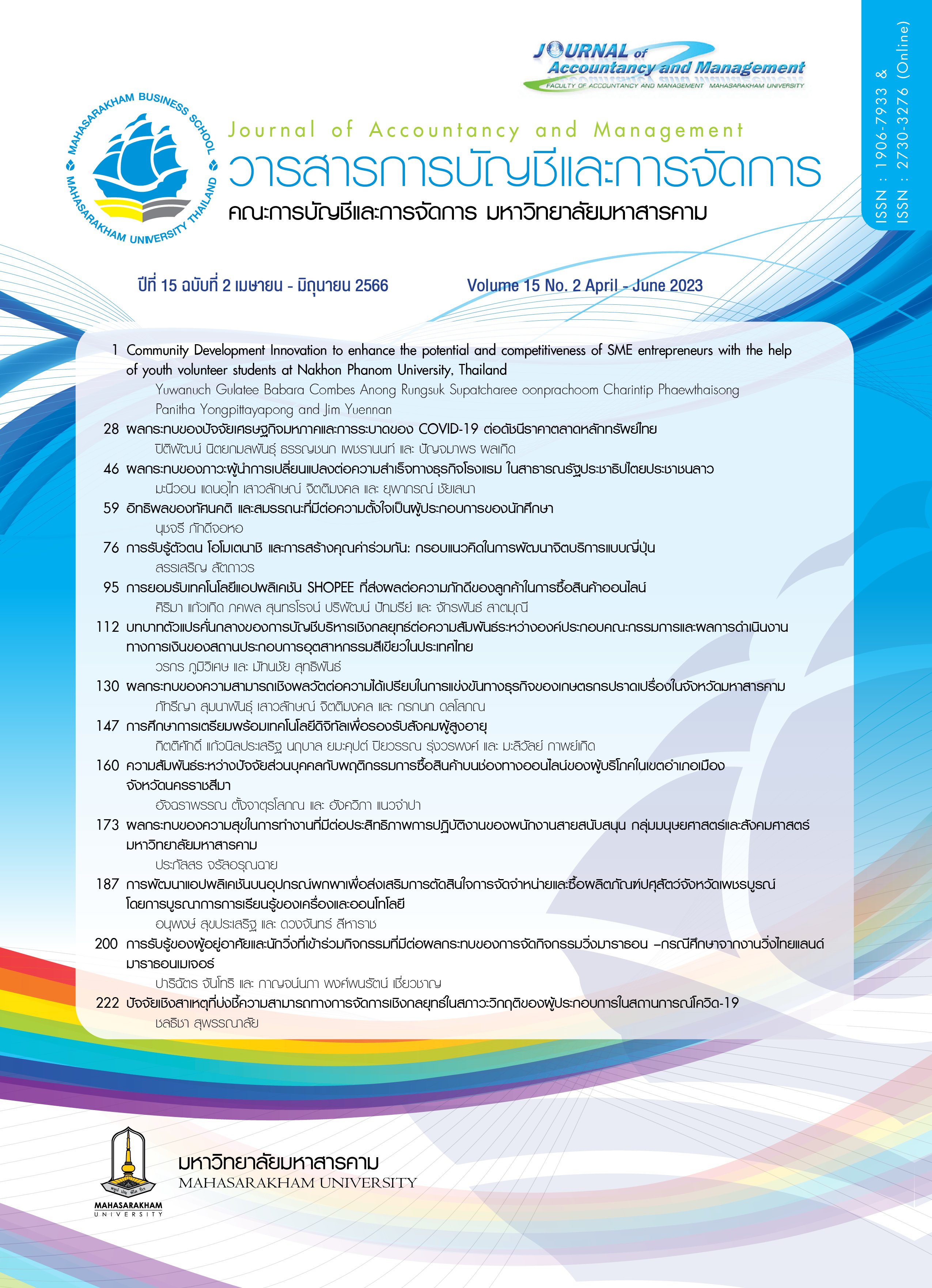อิทธิพลของทัศนคติ และสมรรถนะที่มีต่อความตั้งใจเป็นผู้ประกอบการ ของนักศึกษา
Main Article Content
บทคัดย่อ
การศึกษานี้มีวัตถุประสงค์เพื่อศึกษาอิทธิพลของทัศนคติการเป็นผู้ประกอบการและการรับรู้สมรรถนะของตนเอง ที่มีต่อความตั้งใจเป็นผู้ประกอบการของนักศึกษาระดับปริญญาตรี คณะวิทยาการจัดการ มหาวิทยาลัยราชภัฏนครราชสีมา โดยใช้แบบสอบถามเป็นเครื่องมือในการสำรวจเก็บรวบรวมข้อมูลจากลุ่มตัวอย่างและใช้สถิติในการวิเคราะห์ข้อมูล ผลการศึกษา พบว่า นักศึกษาผู้ตอบแบบสอบถาม จำนวน 415 คน ศึกษาอยู่ชั้นปีที่ 1 – 3 ในระดับปริญญาตรี จาก 12 สาขาวิชา เพศชายและหญิง อายุระหว่าง 18 – 25 ปี ผลการวิเคราะห์สมการโครงสร้างยืนยันอิทธิพลระหว่างตัวแปร โดยบรรทัดฐานกลุ่มอ้างอิงด้านครอบครัวและการรับรู้สมรรถนะของตนเองมีอิทธิพลทางตรงเชิงบวกต่อทัศนคติการเป็นผู้ประกอบการ รวมถึงการรับรู้สมรรถนะของตนเองและทัศนคติการเป็นผู้ประกอบการมีอิทธิพลทางตรงเชิงบวกต่อความตั้งใจเป็นผู้ประกอบการ นั่นคือ อิทธิพลของบรรทัดฐานกลุ่มอ้างอิงด้านครอบครัวและการรับรู้สมรรถนะของตนเองที่มีต่อความตั้งใจเป็นผู้ประกอบการถูกคั่นกลางด้วยทัศนคติการเป็นผู้ประกอบการ
Downloads
Article Details

อนุญาตภายใต้เงื่อนไข Creative Commons Attribution-NonCommercial-NoDerivatives 4.0 International License.
บทความที่ได้รับการตีพิมพ์เป็นลิขสิทธิ์ของวารสารการบัญชีและการจัดการ
ข้อความที่ปรากฏในบทความแต่ละเรื่องในวารสารวิชาการเล่มนี้เป็นความคิดเห็นส่วนตัวของผู้เขียนแต่ละท่านไม่เกี่ยวข้องกับมหาวิทยาลัยมหาสารคาม และคณาจารย์ท่านอื่นๆในมหาวิทยาลัยฯ แต่อย่างใด ความรับผิดชอบองค์ประกอบทั้งหมดของบทความแต่ละเรื่องเป็นของผู้เขียนแต่ละท่าน หากมีความผิดพลาดใดๆ ผู้เขียนแต่ละท่านจะรับผิดชอบบทความของตนเองแต่ผู้เดียว
เอกสารอ้างอิง
กตัญญู หิรัญญสมบูรณ์. (2557). การประกอบการ. ปทุมธานี : ยูโอเพ่น.
กรมส่งเสริมอุตสาหกรรม กระทรวงอุตสาหกรรม. (ม.ป.ป.). ผู้ประกอบการยุคใหม่ทำอย่างไรจึงจะสำเร็จ. ค้นเมื่อ 24 มีนาคม 2565, จาก https://nec.dip.go.th/ebook/book12/book12.pdf
กฤติน โกยวิริยะกุล. (2562). ความตั้งใจในการผันตัวเป็นผู้ประกอบการธุรกิจสตาร์ทอัพของนักพัฒนาซอฟต์แวร์. วารสารระบบสารสนเทศด้านธุรกิจ (JISB), 5(1), 59-71.
กัลยา วาณิชย์บัญชา. (2562). การวิเคราะห์สมการโครงสร้าง (SEM) ด้วย AMOS. พิมพ์ครั้งที่ 3. กรุงเทพฯ : สามลดา.
กาญจนา คำสมบัติ ทรงศักดิ์ สองสนิท และประวิทย์ สิมมาทัน. (2562). การส่งเสริมการรับรู้ความสามารถของตนเองกับกิจกรรมการเรียนการสอน. วารสารวิจัย มหาวิทยาลัย ขอนแก่น (ฉบับบัณฑิตศึกษา) สาขามนุษยศาสตร์และสังคมศาสตร์, 7(3), 69-78.
คมกริช นันทะโรจพงศ์ ภูธิป มีถาวรกุล และประสบชัย พสุนนท์. (2561). พฤติกรรมการเป็นผู้ประกอบการของวัยรุ่นไทย: อิทธิพลของการรับรู้ความสามารถตนเองและการรับรู้การสนับสนุนทางสังคมต่อความตั้งใจในการเป็นผู้ประกอบการในบริบทวัฒนธรรมแบบรวมกลุ่ม. วารสารบริหารธุรกิจศรีนครินทรวิโรฒ, 9(2), 44-59
จิราวัฒน์ จารุพันธ์. (2562). เยาวชนไทยกับการเป็นผู้ประกอบการยุคดิจิทัล. ค้นเมื่อ 2 กุมภาพันธ์ 2563, จาก https://www.dailynews.co.th/it/685400
ณัฐวุฒิ วิเศษ. (2552). รายงานการวิจัย เรื่อง คุณลักษณะและความตั้งใจที่จะเป็นผู้ประกอบการของนักศึกษาสาขาการเป็นผู้ประกอบการ ในเขตกรุงเทพมหานคร. กรุงเทพฯ : วิทยาลัยราชพฤกษ์
ธนาคารกรุงเทพ จำกัด (มหาชน). (2562). Startup ปรับตัวเมื่อธุรกิจขับเคลื่อนโดยคนรุ่นใหม่. ค้นเมื่อ 25 มีนาคม 2563, จาก https://www.bangkokbanksme.com/en/startup-new-generation
นงลักษณ์ วิรัชชัย. (2543). พรมแดนความรู้ด้านการวิจัยและสถิติ. บรรณาธิการโดย เนาวรัตน์ พลายน้อย, ชัยยนต์ ประดิษฐศิลป์ และจุฑามาศ ไชยรบ. ชลบุรี : วิทยาลัยการบริหารรัฐกิจ มหาวิทยาลัยบูรพา.
บรรษัทประกันสินเชื่ออุตสาหกรรมขนาดย่อม (บสย.). (2562). สถิติจำนวน SMEs ในประเทศไทย. ค้นเมื่อ 25 มกราคม 2563, จาก https://www.tcg.or.th/news_inside.php?news_id=37
บุณฑวรรณ วิงวอน. (2556). การเป็นผู้ประกอบการยุคโลกาภิวัตน์. กรุงเทพฯ : สำนักพิมพ์แห่งจุฬาลงกรณ์มหาวิทยาลัย.
ภัทรานิษฐ์ สรเสริมสมบัติ. (2563). คุณลักษณะที่ส่งผลต่อความตั้งใจเป็นผู้ประกอบการ: กรณีศึกษานักศึกษาบริหารธุรกิจมหาวิทยาลัยราชภัฏเชียงใหม่. วารสารวิทยาการจัดการ มหาวิทยาลัยราชภัฏเชียงราย, 15(2), 117-142.
มารยาท โยทองยศ และทรงวาด สุขเมืองมา. (2559). ปัจจัยที่มีอิทธิพลต่อความตั้งใจที่จะเป็นผู้ประกอบการของนักศึกษาปริญญาตรี: กรณีศึกษามหาวิทยาลัยกรุงเทพ. สุทธิปริทัศน์, 30(95), 103-115.
สำนักงานสภาพัฒนาการเศรษฐกิจและสังคมแห่งชาติ. (2564). แผนแม่บทภายใต้ยุทธศาสตร์ชาติ ประเด็นที่ 08: ผู้ประกอบการและวิสาหกิจขนาดกลางและขนาดย่อมยุคใหม่. ค้นเมื่อ 15 มีนาคม 2564, จาก http://nscr.nesdb.go.th/wp-content/uploads/2021/01/09_NS_08.pdf
อนงค์ รุ่งสุข. (2559). รายงานการวิจัยปัจจัยที่มีผลต่อความตั้งใจที่จะเป็นผู้ประกอบการของนักศึกษาคณะบริหารธุรกิจ มหาวิทยาลัยเทคโนโลยีราชมงคลรัตนโกสินทร์. กรุงเทพฯ : คณะบริหารธุรกิจ มหาวิทยาลัยเทคโนโลยีราชมงคลรัตนโกสินทร์.
Ajzen, I. (1991). The Theory of Planned Behavior. Organizational Behavior and Human Decision Processes, 50(2), 178-211.
Ajzen, I. (2002). Perceived Behavioral Control, Self-Efficacy, Locus of Control, and the Theory of Planned Behavior1. Journal of Applied Social Psychology, 32(4), 665-683.
Al-Shammari, M., & Waleed, R. (2018). Entrepreneurial intentions of private university students in the kingdom of Bahrain. International Journal of Innovation Science, 10(1), 43-57.
Aragon-Sanchez, A., Baixauli-Soler, S., & Carrasco-Hernandez, A. J. (2017). A missing link: the behavioral mediators between resources and entrepreneurial intentions. International Journal of Entrepreneurial Behavior & Research, 23(5), 752-768.
Arshad, M., Farooq, O., Sultana, N., & Farooq, M. (2016). Determinants of individuals’ entrepreneurial intentions: a gender-comparative study. Career Development International, 21(4), 318-339.
Babbie, E. R. (2020). The practice of social research. 15th ed. California : Cengage Learning.
Bandura, A. (1998). Health promotion from the perspective of social cognitive theory. Psychology & Health, 13(4), 623-649.
Boukamcha, F. (2015). Impact of training on entrepreneurial intention: an interactive cognitive perspective. European Business Review, 27(6), 593-616.
Farrukh, M., Khan, A. A., Khan, M. S., Ramzani, S. R., & Soladoye, B. S. A. (2017). Entrepreneurial intentions: the role of family factors, personality traits and self-efficacy. World Journal of Entrepreneurship, Management and Sustainable Development, 13(4), 303-317.
Ferreira, J. J., Raposo, M. L., Rodrigues, R. G., Dinis, A., & Paco, A. (2012). A model of entrepreneurial intention. Journal of Small Business and Enterprise Development, 19(3), 424-440.
Fietze, S., & Boyd, B. (2017). Entrepreneurial intention of Danish students: a correspondence analysis. International Journal of Entrepreneurial Behavior & Research, 23(4), 656-672.
Gibson, J. L., Ivancevich, J. M., & Donnelly, J. H. JR. (2011). Organization : Behavior, Structure, Processes. 14th ed. New York : McGraw-Hill.
Hair, J. F., Black, W. C., Babin, B. J., & Anderson. R.E. (2014). Multivariate Data Analysis: Pearson New International Edition. 7th ed. Harlow : Pearson Education.
Henley A., Contreras, F., Espinosa, J. C., & Barbosa, D. (2017). Entrepreneurial intentions of Colombian business students. International Journal of Entrepreneurial Behavior & Research, 23(6), 1017-1032.
Hisrich, R. D., Peters, M. P., & Shepherd, D. A. (2017). Entrepreneurship. 10th ed. New York: McGraw-Hill.
Iakovleva, T., Kolvereid. L., & Stephan, U. (2011). Entrepreneurial intentions in developing and developed countries. Education + Training, 53(5), 353-370.
Kickul, J., Wilson, F., Marlino, D., & Barbosa, S. D. (2008). Are misalignments of perceptions and self‐efficacy causing gender gaps in entrepreneurial intentions among our nation's teens? Journal of Small Business and Enterprise Development, 15(2), 321-335.
Laviolette, E. M., Lefebvre, M. R., & Brunel, O. (2012). The impact of story bound entrepreneurial role models on self-efficacy and entrepreneurial intention. International Journal of Entrepreneurial Behaviour & Research, 18(6), 720-742.
Liñán, F., Urbano, D. & Guerrero, M. (2011). Regional variations in entrepreneurial cognitions: start-up intentions of university students in Spain. Entrepreneurship and Regional Development, 27(6), 187-215.
Moreno-Gómez, J., Gómez-Araujo, E., & Castillo-De Andreis, R. (2019). Parental role models and entrepreneurial intentions in Colombia. Journal of Entrepreneurship in Emerging Economies, 12(3), 413-429.
Pedrini, M., Langella, V., & Molteni. M. (2017). Do entrepreneurial education programs impact the antecedents of entrepreneurial intention?. Journal of Enterprising Communities People and Place in the Global Economy, 11(3), 373-392.
Preacher, K. J., & Hayes, A. F. (2008). Asymptotic and Resampling strategies for assessing and comparing indirect effect in multiple mediator model. Behavioral Research Method, 40(3), 879-891.
Rovinelli, R. J., & Hambleton, R. K. (1977). On the use of content specialists in the assessment of criterion-referenced test item validity. Tijdschrift voor Onderwijsresearch, 2, 49–60.
Santos, S. C., & Liguori, E. W. (2019). Entrepreneurial self-efficacy and intentions. International Journal of Entrepreneurial Behavior & Research, 26(3), 400-415.
Sesen, H. (2013). Personality or environment? A comprehensive study on the entrepreneurial intentions of university students. Education + Training, 55(7), 624-640.
Solesvik, M. Z., Westhead, P., Kolvereid, L., & Matlay, H. (2012). Student intentions to become self‐employed: the Ukrainian context. Journal of Small Business and Enterprise Development, 19(3), 441-460.
Solesvik, M. Z. (2013). Entrepreneurial motivations and intentions: investigating the role of education major. Education + Training, 55(3), 253-271.
Vuorio, A.M., Puumalainen, K., & Fellnhofer, K. (2018). Drivers of entrepreneurial intentions in sustainable entrepreneurship. International Journal of Entrepreneurial Behavior & Research, 24(2), 359-381.
Yeo, V. C. S., Goh, S.-K., & Rezaei, S. (2017). Consumer experiences, attitude and behavioral intention toward online food delivery (OFD) services. Journal of Retailing and Consumer Services, 35, 150-162.
Zhang, P., & Cain, K. W. (2017). Reassessing the link between risk aversion and entrepreneurial intention. International Journal of Entrepreneurial Behavior & Research, 23(5), 793-811.


